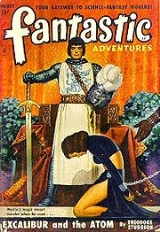
Theodore Sturgeon
Theodore Sturgeon was an American Science-Fiction writer, essayist, and poet.
Sourced
- It's the Simple things that are really effective. Try to remember that.
- Professor Thaddeus MacIlhainy Nudnick, in "Two Percent Inspiration", first published in Astounding Science-Fiction (October 1941); also published in Microcosmic God : Volume II : The Complete Stories of Theodore Sturgeon (1995), edited by Paul Williams, p. 322 ISBN 1556433018
- That Heel. That lousy wart on the nose of progress.
- Character Hughie McCauley, quoting fictional space-opera hero Captain Jaundess, in "Two Percent Inspiration", first published in Astounding Science-Fiction (October 1941); also published in Microcosmic God : Volume II : The Complete Stories of Theodore Sturgeon (1995), edited by Paul Williams, p. 322 ISBN 1556433018
- Love's a different sort of thing, hot enough to make you flow into something, interflow, cool and anneal and be welded stronger than what you started with.
- More Than Human (1953)
- I repeat Sturgeon's Revelation, which was wrung out of me after twenty years of wearying defense of science fiction against attacks of people who used the worst examples of the field for ammunition, and whose conclusion was that ninety percent of it is crud.
The Revelation: Ninety percent of everything is crud.
Corollary 1: The existence of immense quantities of trash in science fiction is admitted and it is regrettable; but it is no more unnatural than the existence of trash anywhere.
Corollary 2: The best science fiction is as good as the best fiction in any field.- Venture Science Fiction (March 1958) The original expression of this has often been declared to have been "Sure, ninety percent of science fiction is crud. That's because ninety percent of everything is crud." According to Philip Klass Sturgeon made the remark during a talk at New York University around 1951. It has also commonly appeared in variant forms such as "Ninety percent of everything is crap" and is often referred to as "Sturgeon's Law" — though he himself gave that title to another phrase:
-
- Sturgeon's Law originally was "Nothing is always absolutely so." The other thing was known as "Sturgeon's Revelation".
- Interview with David G Hartwell, The New York Review of Science Fiction (March - April 1989)
- Sturgeon's Law originally was "Nothing is always absolutely so." The other thing was known as "Sturgeon's Revelation".
- A science fiction story is a story built around human beings, with a human problem and a human solution, which would not have happened at all without its scientific content.
- As quoted in The Issue at Hand : Studies in Contemporary Magazine Science Fiction (1964) by James Blish, p. 14
- If All Men Were Brothers, Would You Let One Marry Your Sister?
- Story title in the anthology Dangerous Visions (1967) by Harlan Ellison.
- It means "Ask the next question." Ask the next question, and the one that follows that, and the one that follows that. It's the symbol of everything humanity has ever created, and is the reason it has been created. This guy is sitting in a cave and he says, "Why can't man fly?" Well, that's the question. The answer may not help him, but the question now has been asked.
The next question is what? How? And so all through the ages, people have been trying to find out the answer to that question. We've found the answer, and we do fly. This is true of every accomplishment, whether it's technology or literature, poetry, political systems or anything else. That is it. Ask the next question. And the one after that.- His explanation of the meaning of a small symbol he used when writing his signature, as quoted in an interview with David Duncan (with an image of his signature).
- Science fiction, outside of poetry, is the only literary field which has no limits, no parameters whatsoever. You can go not only into the future, but into that wonderful place called "other", which is simply another universe, another planet, another species.
- As quoted in an interview with David Duncan
